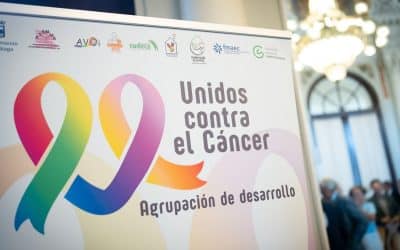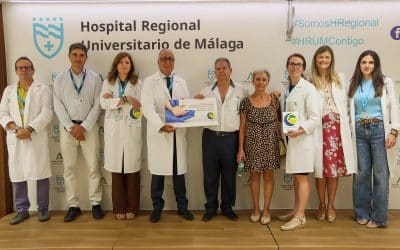- The project is coordinated by Professor Philippe Cestac, Head of the Pharmacy Unit at the University Hospital of Toulouse and Professor at the University of Toulouse III - Paul Sabatier.
- In Andalusia, Francisca Leiva Fernández, a researcher at the Institute and the Malaga Guadalhorce Primary Health Care District (DSMG), is in charge of managing this project, which is part of the promotion of healthy ageing and quality of life. Determinants en la tercera edad.
The Malaga Biomedical Research Institute and Nanomedicine Platform (IBIMA Plataforma BIONAND), together with the Malaga Guadalhorce Primary Health Care District (DSMG) are part of the consortium of the 'STOP IATRO: Prevention of iatrogenic dependence and drug iatrogenesis for healthy ageing' project. In fact, this team, which works in Andalusia with this project integrated by a consortium of six entities and three countries - France, Portugal and Spain - is led by the researcher responsible for the group 'Multimorbidity, adherence, economic evaluation and palliative care in Primary Care' of IBIMA Plataforma BIONAND, and health technician of the Multiprofessional Teaching Unit of Family and Community Care of the Malaga Guadalhorce Primary Care District, Dr. Francisca Leiva.
The ageing of the population is one of the main challenges facing Europe. Increasing life expectancy means ensuring healthy ageing and promoting appropriate care for elderly patients. In this sense, the STOP IATRO project was created with the aim of preventing iatrogenic and iatrogenic dependence.
According to the World Health Organisation (WHO), iatrogenic diseases can be defined as adverse drug reactions or complications induced by non-pharmacological medical interventions. Both iatrogenic dependence and iatrogenic drug dependence have become relevant health problems that require joint actions by professionals and patients.
The STOP IATRO project therefore aims to promote healthy ageing and quality care for older people in Europe. The specific objective is to raise awareness among healthcare professionals about the risks of treatments with regard to the potential iatrogenic effects they may cause, so that patients receive better long-term care, working directly with the recommendations of the WHO Manual on Integrated Care for the Elderly (ICOPE).
This project will also implement collective strategies to prevent the complications associated with care that lead to a loss of autonomy for older people and to reduce the dependency associated with care.
It is aimed at health professionals and the rest of the public. In this sense, professionals will receive training and will participate in the implementation of pilot adaptation plans with the implementation of all knowledge. As for the general public, the actions will be aimed more at people who meet certain requirements to benefit from awareness-raising sessions on independent living, receive information on the appropriate use of medicines by healthcare professionals and strengthen communication between healthcare professionals and patients.
In addition, the consortium that integrates this transnational project has designed a work scheme in which during 2024 an assessment of current knowledge and practices for the prevention of drug iatrogenesis and iatrogenic dependence in elderly people will be carried out, while during 2025 training actions for professionals will be carried out, and between 2025 and 2026, pilot initiatives will be implemented in hospital services, health centres and in the homes of the people participating in the project with the intention, in the long term, to implement innovative approaches, acquired thanks to this project, into clinical practice.
This project receives financial support from the European Union in the framework of the Territorial Cooperation Programme of the South West European Space (SUDOE), which supports regional development by co-financing transnational projects through the European Regional Development Fund (ERDF). The consortium is made up of six European partners. The first of these, the University Hospital of Toulouse, is leading the project. Also from France, the University Hospital of Limoges is participating, together with two Portuguese centres: the Higher School of Health (Technical-Scientific Unit - Health Technologies) of the Polytechnic Institute of Guarda and the Department of Medical Sciences of the University of Aveiro. In Spain, in addition to IBIMA Plataforma BIONAND, the Fundació Salut i Envelliment of the Autonomous University of Barcelona is also participating.
Consortium members anticipate that the next co-management meeting with all partners involved will be held on 26-27 September in Aveiro and Guarda (Portugal) to discuss the progress of the project and the planning of the next milestones to be met.
Finally, Francisca Leiva pointed out that she feels "very proud to be able to lead a project in Andalusia that adds to the quality of care for elderly patients, starting with the training of professionals and even transferring it to the day-to-day life of patients in their own homes". This project, said Dr. Leiva, "will involve three years of collaborative effort with clearly defined objectives, from the results of which we hope to be able to draw conclusions that can be applied to clinical practice", something which, in the words of the researcher herself, "places the patient, once again, at the centre of all the work we carry out in the field of biomedical research that we have been developing in our group in the field of Primary Care".
Raúl J. Andrade Bellido, es Investigador Responsable del grupo consolidado ‘Hepatogastroenterología, Farmacología y Terapéutica Clínica Traslacional’ de IBIMA Plataforma BIONAND, Catedrático y Director del Departamento de Medicina en la Facultad de Medicina de la Universidad de Málaga, Jefe de Servicio Aparato Digestivo del Hospital Universitario Virgen de la Victoria en Málaga. Además, es el Responsable del Grupo Español de Hepatopatias asociadas a medicamentos (Spanish DILI Registry), el Coordinador de la Red Ibero-Americana de Hepatopatías asociadas a medicamentos (SLATINDILI) y también del Registro europeo de Hepatopatías asociadas a Medicamentos (Pro-Euro DILI Registry). Chair de la COST Action CA17112 – Prospective European Drug-Induced Liver Injury Network (PRO-EURO DILI NET) y del EASL DHILI Consortium. Horizonte2020. Framework Programme (European Union).



